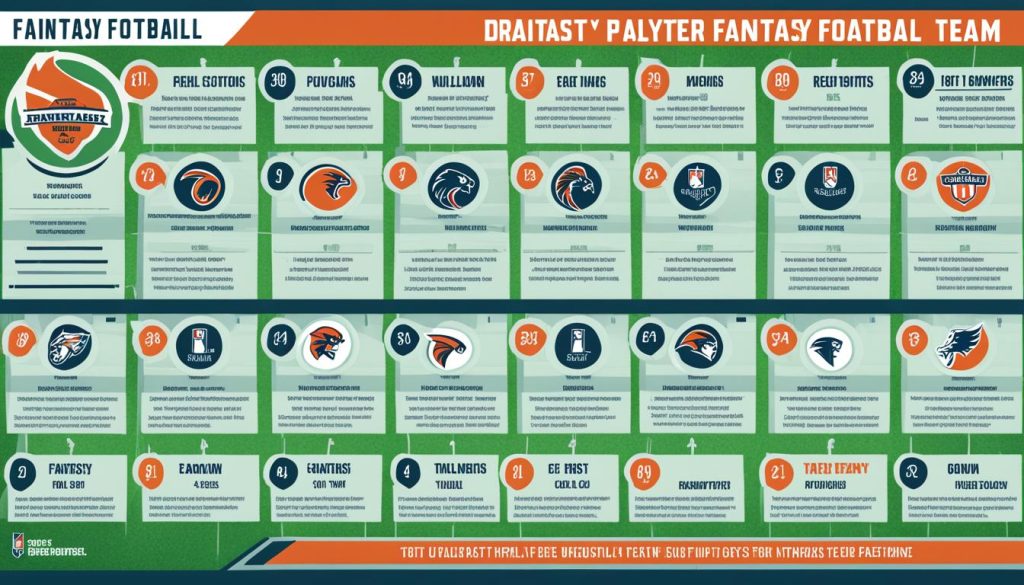Welcome to our beginner’s guide on how to play fantasy football! If you love football and want to take your passion for the sport to the next level, fantasy football is the perfect game for you. In this guide, we will provide you with all the information you need to get started and become a successful fantasy manager. Whether you’re a seasoned football fan or completely new to the game, our guide will help you navigate the exciting world of fantasy football.
Fantasy football is a game that allows you to create your own virtual team by selecting real-life players from various football leagues. As these players perform in their actual matches, they earn points for your fantasy team based on their performances.
In this guide, we will cover topics such as understanding the rules of fantasy football, playing in a league, picking your team and lineup, scoring points, making transfers, budget allocation, and player selection. By the end of this guide, you’ll have a solid understanding of how to play fantasy football and be ready to compete against other managers in leagues of your choice.
So, if you’re ready to dive into the exciting world of fantasy football and embark on an exhilarating journey, let’s get started!
What is Fantasy Football?
In the world of sports, fantasy football has become increasingly popular among fans. It offers a unique and interactive way to engage with the sport and unleash your managerial skills. Fantasy football involves selecting a squad of real-life players, forming your own dream team, and competing against other managers. The players in your team earn points based on their performances in their actual matches, creating an exciting and competitive environment.
Points in fantasy football are awarded for a range of actions performed by the players on your team. These actions can include playing matches, scoring goals, keeping clean sheets, earning assists, and playing well overall. Essentially, you are rewarded for the success of your chosen players in real-life matches.
It’s important to note that different fantasy games may have slightly different rules and scoring systems. While the core concept remains the same, the specific scoring criteria may vary. This adds an element of diversity and strategy to the game, as you need to adapt your tactics to the specific rules of the fantasy game you are participating in.
To help you understand the concept of fantasy football better, here’s a visual representation of how the scoring system works:

| Action | Points Awarded |
|---|---|
| Playing a Match | 2 points |
| Scoring a Goal | 6 points |
| Keeping a Clean Sheet (Goalkeeper/Defender) | 4 points |
| Earning an Assist | 3 points |
| Playing Well | 1 point |
This table provides a glimpse into the scoring system, but each fantasy game may have additional criteria and point allocation. Familiarizing yourself with the specific rules of the game you are playing is vital to maximizing your chances of success.
Now that you have a basic understanding of what fantasy football is and how it works, let’s explore the next section, which delves into playing in a league and the various types of leagues you can join.
How to Play Fantasy Football?
Fantasy football is a game that brings football enthusiasts together, and one of the most exciting aspects is playing in a league. While you can certainly enjoy the game on your own, joining a private league with friends or colleagues adds an extra level of competitiveness and fun.
In a private league, you’ll have the opportunity to compete against others, showcase your football knowledge, and claim bragging rights as the ultimate fantasy manager. These leagues often have their own rules and scoring systems, which adds another layer of strategy and excitement to the game.
If you don’t have a private league to join, don’t worry! Many platforms also offer public leagues where you can join teams with randomly-assigned players. This is a fantastic option if you want to experience the thrill of competing against a wider community and enjoy the social aspect of fantasy football.
Regardless of whether you decide to join a private or public league, playing in a league truly enhances the fantasy football experience. The camaraderie, competition, and shared passion for the beautiful game make it an unforgettable journey.

A Comparison of Private and Public Leagues
| Private Leagues | Public Leagues |
|---|---|
| Play with friends or like-minded individuals | Compete against a wider community |
| Create your own rules and scoring system | Follow standardized rules and scoring |
| Enjoy a personalized and unique experience | Experience the thrill of unpredictability |
| Establish rivalries and friendly banter | Engage in friendly competition with strangers |
Picking Your Team and Lineup
As a fantasy manager, you’ll need to pick a team or squad of players within a budget. The number of players and positions may vary, but typically you’ll have a certain number of goalkeepers, defenders, midfielders, and forwards.
When selecting your players, it’s important to consider their past performances, current form, and upcoming fixtures. Conduct thorough research to assess players’ statistics, injury status, and any other relevant factors that may influence their performance. This will help you make informed decisions and optimize your fantasy football lineup.
Once you’ve selected your team, the next step is to set your lineup each week. This involves choosing which players to start and which players to place on the bench. Your lineup decisions should be based on various factors such as player form, opponent strength, and any injuries or suspensions. It’s essential to stay updated with the latest team news and injury reports to make the best lineup decisions.
Consider using a combination of proven performers and differential picks in your lineup. Proven performers are players who consistently deliver strong performances and are likely to earn you points consistently. On the other hand, differential picks are less popular players who have the potential to outperform expectations. Adding a few differential picks to your lineup can help you gain an edge over your competitors.
Remember, flexibility is key. As the season progresses, player form and circumstances may change. It’s important to stay adaptable and make necessary changes to your lineup when required. Avoid being too attached to underperforming players and be proactive in making transfers to optimize your team’s performance.
Tips for Picking Your Team and Setting Your Lineup:
- Research player performance, statistics, and upcoming fixtures.
- Consider player injuries, suspensions, and form.
- Balance your team by allocating your budget wisely.
- Include both proven performers and differential picks in your lineup.
- Stay updated with the latest team news and injury reports.
- Be flexible and make necessary changes to your lineup when required.
| Position | Description |
|---|---|
| Goalkeeper | The player who defends the goal and earns points for clean sheets and saves. |
| Defender | The player who defends and earns points for clean sheets, goals, and assists. |
| Midfielder | The player who controls the midfield and earns points for goals, assists, and clean sheets. |
| Forward | The player who plays in advanced positions and earns points for goals and assists. |
Scoring Points
In fantasy football, points are awarded to players based on their real-life performances. Various actions on the field can contribute to a player earning points for your fantasy team. Here are some key factors that can influence a player’s point accumulation:
- Playing Matches: Every appearance made by a player in a real match can earn them points. The more matches they play, the more opportunities they have to contribute to your fantasy team’s score.
- Scoring Goals: Whenever a player scores a goal, they receive points. Goals are often highly rewarded in fantasy football scoring systems, as they have a significant impact on the outcome of matches.
- Keeping Clean Sheets: If a player, particularly a goalkeeper or defender, prevents the opposing team from scoring, they can earn points for keeping a clean sheet. This rewards solid defensive performances.
- Earning Assists: Players who assist in scoring goals also earn points. Assists acknowledge the contribution a player makes in setting up their teammates to find the back of the net.
- Playing Well: Some fantasy football scoring systems include additional metrics for players who perform exceptionally well during a match. These can include statistics such as successful dribbles, interceptions, or accurate passes.
While positive actions can boost your players’ point totals, it’s important to note that there are also actions that can result in lost points. Conceding goals or receiving bookings, such as yellow or red cards, can lead to deductions from a player’s overall score.
Making Transfers
Throughout the season, as a fantasy football manager, you may find the need to make transfers to improve your team. Whether it’s to replace an underperforming player, adjust for injuries or suspensions, or take advantage of emerging talent, the ability to make transfers is a crucial aspect of playing fantasy football.
Most fantasy football games provide a certain number of free transfers each week, allowing you to make changes without incurring any penalties. However, if you exceed the allocated number of free transfers or wish to make additional changes, penalty points may be deducted from your overall score. It’s important to consider the impact of penalty points when deciding on making extra transfers, as they can affect your performance in the long run.
Strategic planning is key when it comes to transfers. Keeping an eye on player performance, form, and upcoming fixtures can help inform your decision-making process. It’s advisable to analyze the strengths and weaknesses of your current squad and identify areas that require improvement. Additionally, staying updated with injury news, suspensions, and transfer rumors can provide valuable insights into potential transfer targets.
When making transfers, it’s essential to consider the budget allocated to your team. Each player has a specific value assigned to them, and balancing your budget is crucial in building a well-rounded squad. Carefully selecting players who offer good value for their price can help optimize your team’s strength and maximize your points potential.
Transfer Strategy Tips
- Plan ahead: Analyze upcoming fixtures and consider making transfers based on favorable matchups.
- Monitor player form: Keep track of player performances and identify potential transfer targets based on consistent form.
- Look out for differentials: Seek out players who may be lesser-known but have the potential to deliver high returns.
- Consider team dynamics: Evaluate how a new transfer will fit into your team’s overall structure and playing style.
- Be patient: Avoid making knee-jerk transfers based on short-term performance fluctuations. Give players time to prove their worth.
By strategically planning your transfers and considering factors such as budget allocation, upcoming fixtures, and player form, you can optimize your fantasy football team to achieve better results. Remember, making transfers is a dynamic process throughout the season, and adapting to changing circumstances is key to staying competitive.
Budget Allocation and Player Selection
When building your team, you’ll need to allocate your budget wisely. It’s important to balance spending across positions and prioritize players who are likely to perform well. Researching player values, form, and team dynamics can help you make informed decisions when selecting players for your team.
When it comes to budget allocation, consider dividing your budget between different positions strategically. While having star players in your team is desirable, it’s equally important to have a balanced squad that covers all positions. Investing heavily in one position may leave you with limited funds for other areas, leading to potential weaknesses in your team. Spread your budget across different positions to ensure a well-rounded lineup.
Researching player values is crucial in order to find the best value for money. Look for players who consistently perform well and offer good return on investment. Keep an eye on the transfer market and analyze player statistics to identify potential gems that may be undervalued by others. By identifying these undervalued players, you can maximize your team’s potential without overspending.
Form is another important factor to consider when selecting players. Players who are in good form are likely to continue performing well and earning points for your fantasy team. Stay updated on player performance and look for players who have been consistently performing at a high level in recent matches. However, also be aware that form can be temporary, so it’s important to strike a balance between form and underlying quality.
Furthermore, team dynamics play a vital role in player selection. Understanding how players interact and perform together can give you an edge in making informed decisions. Consider the playing style of the team and how it complements the strengths of individual players. Assess the attacking potential of different teams and players to identify those who are more likely to contribute goals and assists.
Key Considerations for Player Selection:
- Allocate your budget wisely by balancing spending across positions.
- Research player values to find the best value for money.
- Consider player form and go for players who are in good form.
- Analyze team dynamics to understand how players perform together.
By carefully considering budget allocation, conducting thorough research, and analyzing player performance and team dynamics, you’ll be better equipped to pick the right fantasy football players for your team. Make informed decisions and remember to regularly evaluate and adjust your team throughout the season to maximize your chances of success.
Conclusion
Playing fantasy football is a thrilling way to immerse yourself in the world of football and showcase your managerial skills. By adhering to the game’s rules, employing strategic team selection, and keeping a close eye on player performances, you can amplify your fantasy football experience and maximize your chances of achieving success.
One of the key fantasy football tips is to conduct thorough research before making player selections. By analyzing player values, recent form, and team dynamics, you can make informed decisions that give your team an edge over the competition. Remember, staying updated with the latest news and insights is vital to staying ahead in the game.
While it’s important to strategize and aim for victory, always remember to enjoy the competition. Fantasy football is ultimately about having fun and connecting with fellow football enthusiasts. So, whether you’re competing in private leagues with friends or joining public leagues, embrace the excitement, share your fantasy football strategies, and celebrate the thrills and surprises that the game has to offer.






